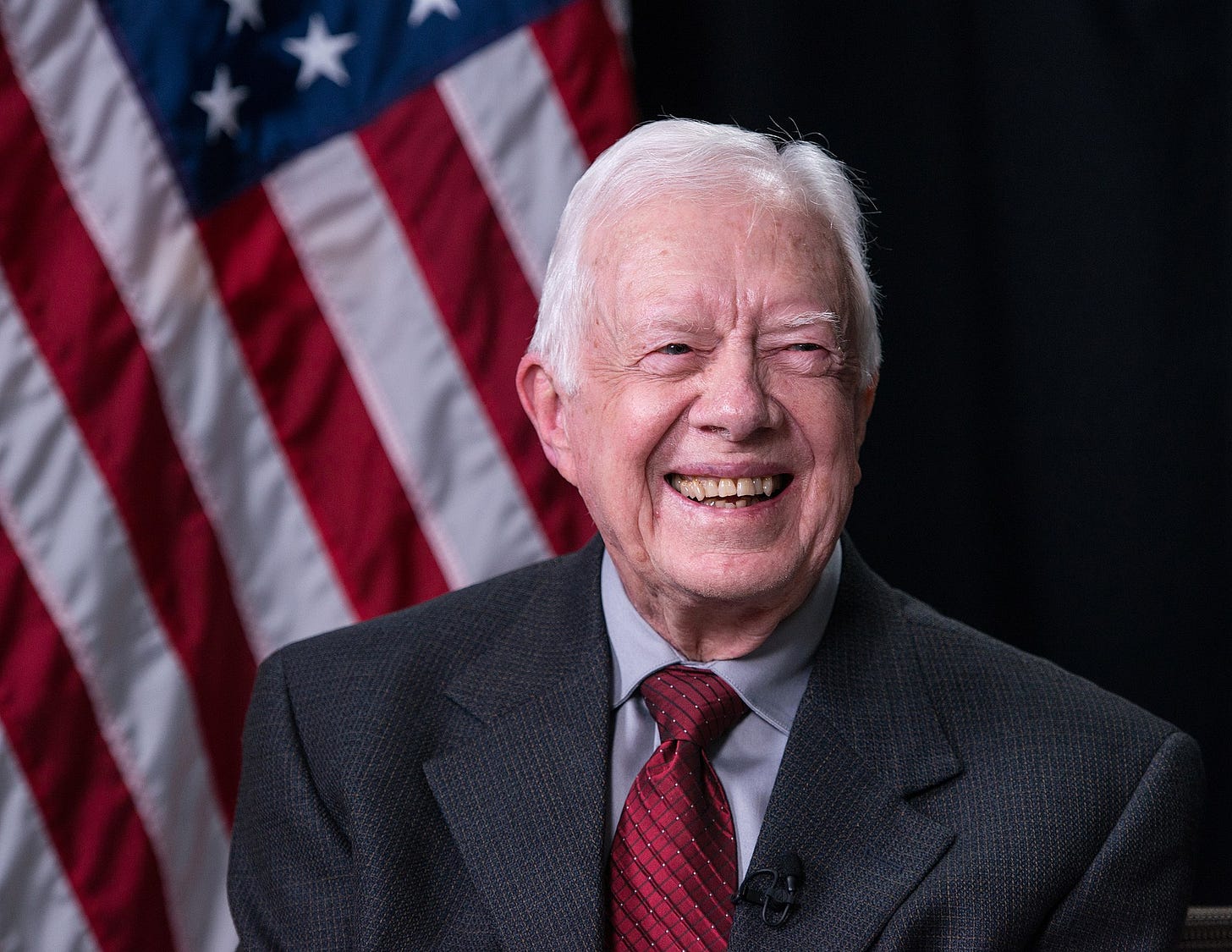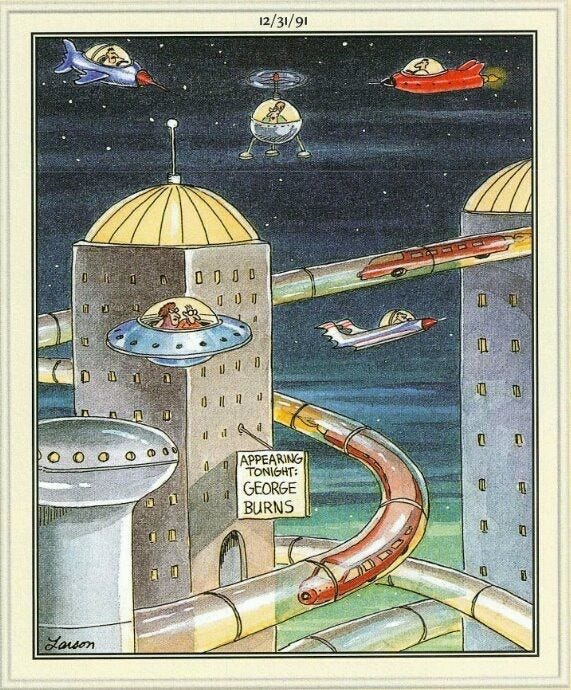My Eternal Old Man
The ex-president I've always irrationally used as my own private picture of Dorian Gray.
Public domain photo by Lauren Gerson.
Jimmy Carter is 98 and about to die, and I’m going to take his death harder than most people. I’m not related to him, and I don’t hold him in any special regard as a politician — though there’s a strong case to be made that he’s the least evil president in living memory, but that’s not saying much. So while I’m not saying I’ll take it harder than anyone, I am going to have a little bit of a bad day.
His representatives say he’s ill and planning to “spend his remaining time at home.” Apparently he’s receiving home hospice care, surrounded by family — the best death anyone can reasonably hope for.
What bothers me so much is that more than any other death I’ve ever known about, this one will put to bed my last lingering scraps of childish denial about my own mortality. The reason is that Carter is my own personal “Eternal Old Man,” a term I made up that requires a lot of explanation. Basically: we share a birthday. But there’s more to it than that. Stay with me here.
When people die before old age it’s extra tragic, but in some ways less existentially terrifying than when the very old die. Young people tend to die of rare cancers, or avoidable accidents. It’s easy to quarantine this information in a relatively safe part of your brain because rare illnesses are rare, and accidents can be avoided.
I got a secret little surge of panic when Betty White died at 99. Same with Carl Reiner at 98. The first time I can remember this was when I was 11 and George Burns died at 100.
Burns was the subject of perhaps the most poorly-aged Far Side comic Gary Larson ever drew. It was funny in 1991, I guess, to picture a Jetsons-style future where famously old man George Burns is still not just alive, but performing. But he died a little over four years after it was published, and today the comic makes no sense at all unless you can remember the original context.
Gary Lason’s The Far Side, posted here for the purpose of art criticism
In his late 90s, Burns’ whole bit was that he was going to be dead soon. That includes this rather astonishing TV spot in which he says of AFL football, “A game that’s lasted longer than me? I’d like to see that.” The joke isn’t exactly side-splitting (You have to know that “I’d like to see that” was a pre-existing tagline the AFL was using at the time in its ads). But what’s wild about the joke is that it only works at all if he dies between the filming of the ad, and the ad airing, which is exactly what happened.
So he sat there in that chair, surrounded by dancers, doing god-knows-how-many takes of a joke predicated on the idea that his body would fail him in the coming weeks, and he would experience whatever people experience as they enter the unknowable frontier. Now that’s a showbiz pro.
His cause of death, by the way, was cardiac arrest — whatever “cause of death” means when you’re 100. After about 89, “cause of death” is sort of like when a lawnmower engine is still running after you’ve emptied the gas tank to put it in your shed for the winter. Technically, who knows? Maybe the spark plug gave out right at that moment, but you’re not going to be curious.
But it looks like Burns was ready to die. And we’d all like to assume someone like Jimmy Carter is ready, at 98, to die as well. Because at 98, we all tend to assume we’ll have found some sense of quietude. It would certainly be undignified for Carter to die at an advanced age, pleading with God to keep on living as he slips away.
But hey, here comes one of my absolute worst memories: in the car ride home from my great uncle’s funeral, my Grandma’s friend who was in her late 80s, quietly cried to herself repeating “I don’t wanna die too. I don’t wanna die too,” in a tiny voice only I could hear, until I distracted myself (and hopefully her) by reading The Lord of the Rings to my sister in a British-accented narrator voice.
So anyway, part of what makes my birthday buddy Jimmy Carter’s death so real is that I was born on his 60th birthday, and 60 is typically when young people mark the start of “old age.” I know people who are currently 60, such as Matthew Broderick, will beg to differ, but sorry, that’s a lot of people’s definition of “old,” including me for most of my life.
So Carter has always been my personal Eternal Old Man. Not everyone is given an Eternal Old Man at birth like I was, but here’s how it works: you tell yourself that your Eternal Old Man’s continued longevity guarantees you no fewer than 60 more years from the current moment. Your eternal old man serves as living proof that your personal timeline is one of those timelines from math class that ends with an arrow, meaning “and stretching infinitely in this direction.” Ipso facto, death is optional. If your Eternal Old Man dies, the arrow becomes a dot. Unthinkable.
I think I’ve been aware for about 15 years that I’ve been using Jimmy Carter as a psychological security blanket, or a picture of Dorian Gray that exclusively exists in my imagination. It doesn’t hurt that he’s stayed busy. He was active enough to have a long segment for PBS Newshour filmed in his house at 96, and wrote a New York Times op-ed at 97. Can people who eventually die do that???
The answer is of course, yes. Jimmy Carter, my Eternal Old Man, is about to die, and cease being eternal. It will be good, in a way, to get this over with.





This is an excellent essay. I think I must play similar games with mortality (although too many of my eternal old men are dead, and my contemporaries seem to die young)
In 1971 mom took me (age 5) and my sister (age 2) to the Georgia State Capitol building to show us where her mother (Granny) worked in the governor's office typing pool.
Afterward, walking down the hall, just the three of us, Mom tenses up, and this man walks up with a warm greeting, shakes my hand and pats my sister on the head.
I had no clue who he was, but I could tell from my mom's vibe, it was important, so I paid close attention.
A few minutes later she told me it was Governor Carter and explained how lucky we had been to happen to meet that way.
So ever since, no matter what the state of politics or recent history, I've followed him, read his books, volunteered a summer at Habitat etc.
Thanks for this.
Nice work - many thanks. He’ll go from America’s Eminence Gris to Posthumous Legend, and will be keenly missed for his singular combination of dignity, integrity and charity. But mourn him knowing that he departed on good terms with his maker. The last act was always inevitable, but his manner of leaving was up to him and he was aware of that intractable outcome in a way that almost everyone seems determined to look away from and deny even as we crowd our lives with the detritus of material wealth. Remember him fondly for that wisdom, and with gratitude that you have a special reason for recalling it. Maybe he was meant to be a model for us all of how to live a life beyond the pinnacle of socially defined power and success.